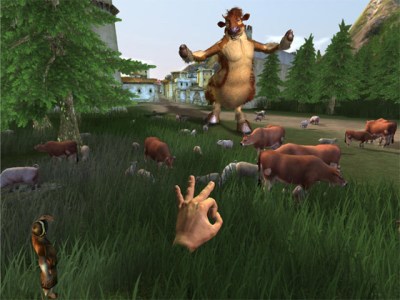I want to be God
From Dust, Eric Chahi’s return to game design has seen the revival of the so-called ‘god game’. But with large sections of the game dedicated to more of a caretaker role, what if instead of these single-minded approximations of god, we had a true God Sim?
Religion is obviously a contentious subject and when you’re making entertainment, it’s wise not to tread on too many toes in your attempts to depict it. Perhaps that’s why most so called ‘God games’ that claim to put you in the position of a God, limit your actions to a role of a non-specific old-testament style fire and brimstone deity, with some terra-forming thrown in for good measure (and in one specific case, you could train a giant evil cow to eat your rivals.) But being a God – obviously I’m speaking from experience here – isn’t just about throwing around spells and using fancy parlour tricks to impress people into worshipping in you, it’s about defining cultures, deferring power and all kinds of things that could be adapted into interesting game mechanics.
Most God games choose to focus on the raw meaning of a primal god, raising uncultured tribes up-to being a more prominent version of themselves, without the people ever really changing or being affected by your actions. Followers give you their undivided worship in return for your time and power, but there’s always been something of vanilla flavour of the gods we get to become. I want to be my own God, I want to create a society in my image, that learns and adapts to my whims and creates its own homage to me. Some games have explored these ideas to some extent such as Black and White, with pet-like avatars who adapt according to our behaviour, becoming a cruel enforcer or benevolent guardian on our behalf according to the way we treat them. But for me that’s not enough.
N.B. This isn’t an article about the existence of God or gently leveraging my own beliefs onto the reader, for that purpose I’m going to be taking everything at face value – God/s created the world, miracles occurred etc, simply because it’s easier and potentially less offensive than writing ‘allegedly’ or ‘supposedly’ every five seconds (for the record I’m an Atheist).
The Commandments
Religions can seek to dictate the way we live, with laws and rules passed down to mortal man by prophets, messiahs or by the Gods themselves. Would it possible in a God game to set rules of our own, to bestow our immortal wisdom on our followers and shape them in our own image, forcing them to adhere to our moral code? The simple answer is yes, but it would require a certain complexity of AI for there to be any point. For instance, if ‘Thou shalt not kill’ is available to set as a rule, there would need to be situations in which the people actually kill each other, similarly for us to say ‘Don’t steal’ it would have to occur anyway. More obscure religious rules such as “Thou shalt not covet thy neighbour’s ass” would probably not be worthwhile including, unless the AI designer has a whole lot of time on their hands.
If this sounds like boring regulation to you, then I agree. What I’m primarily interested in would be how creating and placing different rules would have knock-on effects throughout the culture you create. If for instance you put in an environmental rule such as “Do not cut down a tree without planting another.” How would your culture change from what we expect? Would the people find themselves slowly building a self-sustaining environment around them? Maybe it would force your people to become nomadic, moving between areas in time with the growth of a new batch of trees. Perhaps through our pro-green rules our society is harmonious and happy, yet technologically backwards. With enough rules and ways to alter the AI modifiers, we could begin to find emergent cultures that bear little resemblance to the ones that inhabit human history. Or perhaps we’ll try to replicate some minor deity of old and see the cousins of a forgotten people replicated in the game.
Gods are represented on earth by their mortal followers
Most religions have clergy and many have had figures who are said to be their God’s representative on Earth. Christianity, Judaism and Islam have all had Prophets, men who have spoken directly to their God and have the task of spreading their word. Rather than direct control, rather than us moving each of our followers about, the goal here could be to pass on our messages on to a person we have chosen as our prophet or representative on Earth.
Now, if each and every person in this game was essentially the same person, this would be pointless, we’d instead need to have individualism, with individual traits and skills, even motivations. Again this requires a certain complexity of AI, but there is precedent. The Sims 3 used a system of combining traits, to form an overall personality that could be employed here to great effect. Imagine we choose the most ambitious, charismatic and cunning man we can find, and then imbue him with the power to perform miracles. He’d probably be fantastic at spreading the religion, but would he have our interests at heart, or his own? Perhaps we choose the wise and benevolent teacher, to spread our message. But if he happens to be a pacifist, could we be certain he wouldn’t dilute the messages of hate and intolerance we may include that are vital to the survival of our Religion?
MULTIGOD
So far, I’ve mostly approached this from Monotheistic perspective, speaking of ‘God’ as a singular entity. But many religions of the world have or have had rival gods, warring Gods, Gods who are all different aspects of the same God and so on. In almost every God game that exists, the situation is one god to one clan, as you attempt to take over and dominate rivals. But the religious pantheons of ancient times were rich tapestries of mixed loyalties, relationships and rivalries. If we get to define our laws, our cultures and the saviours of our religions, the other gods and would-be-rivals should have the same opportunity and seeing mixed beliefs entering the same society and adapting to each others presence could be compelling.
If we assume the ultimate goal of the game is a competitive one – our goal is to become the major deity in the world – then how do the different gods engage with one another? We can oppose them through our existence, our popularity and colliding beliefs, by whispering the word ‘heretics’ in the ear of our prophets perhaps. Direct confrontation born of religion obviously would be an option, but cultural assimilation and proximity too has seen Religions spread beyond racial boundaries, and there are countries like china that have largely been secular and embraced Pluralism for most of their history. Would it then be possible for a single tribe to have competing religions, or gods who work together to better a single people, by embodying or specialising in certain aspects? For instance, a god of war who can enhance a nations power and military prowess would be ably supported by a goddess of fertility, who provides the bodies to man the barricades by enhancing the birth-rate.
Has it been tried before?
The more I write, the more the design of certain existing games becomes relevant. I’ve already mentioned the Sims as a starting point, with the traits system of creating personalities for important figures in society. Another touchstone – also created by Will Wright – is Spore. Spore was a hugely ambitious title, that allowed us to create our own species, to define parts of it’s culture and to design the aesthetics of their appearance, clothing and much more. Yet the different phases of our species’ history felt like underdeveloped mini-games, there was no cohesive whole. To this day I am still baffled as to how a game brimming with as many brilliant ideas as Spore managed to be such a damp squib.
But while Spore and The Sims both have more of a focus on direct control, my idea of a ‘God Sim’ is about influence, rather than dictatorship. It’s about influencing the way people and cultures develop, through our commandments, through our priests and messiahs and less often through the miracles we can perform. We influence an AI; we plant seeds and watch them grow into things beyond our initial imagining. We look down in approval or horror as wars are waged in our name. Perhaps as time goes on and humans become more powerful and numerous, our own power begins to increase proportionately. Where once as a young deity we could direct a stream down an intricate path, now our power is of such a magnitude we can only operate in broad strokes, our direct actions cause earthquake and tsunamis, the art of the subtle has become lost to us. Because we can no longer touch the world at an individual level, despite our immense power, people start to lose faith. In our impotent rage, we rain down ash from the skies, tidal waves sweep over the unfaithful as the earth rumbles and splits beneath the very homes the disobedient mortals inhabit.
We are a bloated god, who has only the power left to destroy, as our followers run amok, our messages lost through the Chinese whisper of human interpretation. To regain our influence, we are waiting, waiting for the right person to emerge, upon whom we can bestow our gifts and who must be the perfect combination of wisdom, confidence, piety and charisma. The messiah, who can reaffirm our message and set the world to rights.
God games have always been a study of power, I want to see one that is a study of influence, not direct control. To watch something grow and try to subtly craft it to our will using limited tools, to deal with the unexpected consequences that arise from our actions. And ultimately to pour destruction onto our disappointments before starting again. That’s the God game I’d like to see.
As always post any thoughts or comments below!


